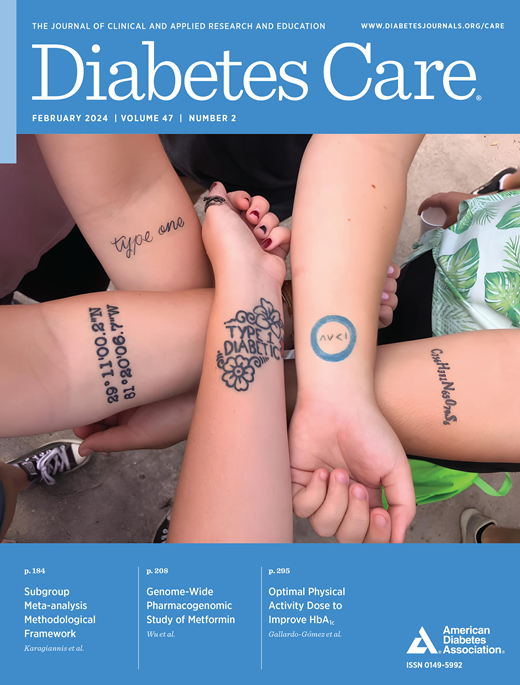Advancing Type 1 Diabetes Management: Integrating Novel Therapies, Technologies, and Adjunctive Approaches
IF 16.6
1区 医学
Q1 ENDOCRINOLOGY & METABOLISM
引用次数: 0
Abstract
In type 1 diabetes, a condition that necessitates lifelong exogenous insulin replacement, there is heavy reliance on technology-assisted insulin delivery and glucose monitoring. Yet, people living with type 1 diabetes still face dysglycemia, weight gain, vascular complications, ketoacidosis and severe hypoglycemia, and psychological distress. Cardiovascular and kidney disease remain the leading causes of morbidity and mortality, yet traditional risk factors (smoking, hypertension, hyperlipidemia, obesity, hyperglycemia) incompletely explain this excess burden. Emerging evidence highlights the role of insulin resistance, inflammation, and endothelial dysfunction exacerbated by current subcutaneous insulin therapies in type 1 diabetes, independent of overweight/obesity status. This has fueled interest in addressing metabolic challenges in type 1 diabetes through novel insulin analogs, adjunctive noninsulin therapies, and integrated technologies. Our review explores the potential synergy between technologies and adjunctive therapeutics to address unique physiologic drivers of metabolic dysfunction in type 1 diabetes. Innovations such as multihormonal systems, dynamic glucose and ketone monitoring, and automated insulin titration hold promise. However, leveraging emerging insights from nutrient-stimulated hormone-based therapies and other drug classes such as insulin-sensitizing agents and sodium–glucose cotransporter 2 inhibitors could pave the way for designing combination type 1 diabetes–specific therapies. Large, placebo-controlled trials are needed to progress the field toward use of combination therapies that reduce metabolic and vascular complications and ease patient burden in type 1 diabetes.推进1型糖尿病管理:整合新疗法、技术和辅助方法
1型糖尿病是一种需要终生外源性胰岛素替代的疾病,严重依赖技术辅助胰岛素输送和血糖监测。然而,1型糖尿病患者仍然面临着血糖异常、体重增加、血管并发症、酮症酸中毒和严重低血糖以及心理困扰。心血管和肾脏疾病仍然是发病率和死亡率的主要原因,但传统的危险因素(吸烟、高血压、高脂血症、肥胖、高血糖)不能完全解释这种过度负担。新出现的证据强调了胰岛素抵抗、炎症和内皮功能障碍在目前的皮下胰岛素治疗中加剧的作用,与超重/肥胖状态无关。这激发了人们对通过新型胰岛素类似物、辅助非胰岛素治疗和综合技术解决1型糖尿病代谢挑战的兴趣。我们的综述探讨了技术和辅助治疗之间的潜在协同作用,以解决1型糖尿病代谢功能障碍的独特生理驱动因素。诸如多激素系统、动态葡萄糖和酮监测以及自动胰岛素滴定等创新都有希望。然而,利用来自营养刺激激素疗法和其他药物类别(如胰岛素增敏剂和钠-葡萄糖共转运蛋白2抑制剂)的新见解,可以为设计1型糖尿病特异性联合疗法铺平道路。需要大规模的安慰剂对照试验来推进联合疗法的使用,以减少代谢和血管并发症,减轻1型糖尿病患者的负担。
本文章由计算机程序翻译,如有差异,请以英文原文为准。
求助全文
约1分钟内获得全文
求助全文
来源期刊

Diabetes Care
医学-内分泌学与代谢
CiteScore
27.80
自引率
4.90%
发文量
449
审稿时长
1 months
期刊介绍:
The journal's overarching mission can be captured by the simple word "Care," reflecting its commitment to enhancing patient well-being. Diabetes Care aims to support better patient care by addressing the comprehensive needs of healthcare professionals dedicated to managing diabetes.
Diabetes Care serves as a valuable resource for healthcare practitioners, aiming to advance knowledge, foster research, and improve diabetes management. The journal publishes original research across various categories, including Clinical Care, Education, Nutrition, Psychosocial Research, Epidemiology, Health Services Research, Emerging Treatments and Technologies, Pathophysiology, Complications, and Cardiovascular and Metabolic Risk. Additionally, Diabetes Care features ADA statements, consensus reports, review articles, letters to the editor, and health/medical news, appealing to a diverse audience of physicians, researchers, psychologists, educators, and other healthcare professionals.
 求助内容:
求助内容: 应助结果提醒方式:
应助结果提醒方式:


